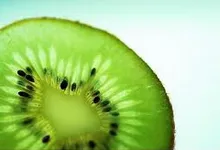 During postharvest, the quality decay in fruit is correlated to ethylene production. The ethylene action can be inhibited by 1-MCP (1-methylcyclopropene), whose effect to control fruit ripening in both climacteric and non-climacteric fruits has been widely studied.
During postharvest, the quality decay in fruit is correlated to ethylene production. The ethylene action can be inhibited by 1-MCP (1-methylcyclopropene), whose effect to control fruit ripening in both climacteric and non-climacteric fruits has been widely studied. The efficacy of 1-MCP on delaying fruit softening depends on fruit maturity stage at harvest, 1-MCP concentration applied and time of fruit exposure to the treatment, storage conditions, and fruit temperature at the time of 1-MCP application.
In the study on kiwifruit (Actinidia deliciosa "Hayward") conducted by Cantin et al. (2011), the objective was to evaluate the effect of different 1-MCP concentrations (0; 0.5; 1.0 µl/L) and duration of fruit exposure (12; 24 h) on flesh softening of fruits stored under different storage conditions.
After 1-MCP treatments, half of the fruit of each treatment combination (dose x duration) was stored in a cold room at 1°C with 1.0 µl/L ethylene, and the other half was stored at 1°C without ethylene. Fruit storage in cold room lasted up to 6 months before ripening. After 0, 2, 4, 6 months of storage with or without ethylene, fruits were moved at 20°C to evaluate their shelf-life, in terms of flesh firmness that was determined by a penetrometer every 2 days until softening reached ≤10 N (Newton), which was the minimum value acceptable for consumption.
Results showed that treatment with 1-MCP allowed the extention of the kiwifruit shelf-life by maintaining firmness both in fruits ethylene-free and in fruit ethylene treated. Application of 1-MCP resulted to be fundamental when kiwifruits could suffer from ethylene contamination during the cold storage due to the ethylene production by other commodities. The study has demonstrated that the efficacy of 1-MCP application to extend kiwifruit shelf-life can depend on time of fruit exposure to 1-MCP and on fruit storage conditions, thus the 1-MCP protocol to follow should be arranged according to the length and type storage.
For short periods of cold storage (up to 2 months), 0.5 µl/L of 1-MCP for 12 hours applied just after harvest would be the recommended protocol to use, apart from ethylene presence in the cold room. For longer periods, the protocol to follow will depend on if the fruit is ethylene-free or ethylene contaminated during cold storage. If the fruit is stored without ethylene, 0.5 µl/L of 1-MCP for 12 hours would be the most effective combination to prolong kiwifruit shelf-life.
If the fruit is stored in a cold room with ethylene, it is suggested to extend the duration of the treatment up to 24 hours and increase 1-MCP concentration to 1.0 µl/L to obtain the best results. These 1-MCP protocols were shown to be beneficial also for the shelf-life at 20°C after cold storage. After 6 months of cold storage, using 1 µl/L of 1-MCP for 24 hours has allowed a shelf-life of 8 days.
Original study. Cantin C.M., Holcroft D., Crisosto C.H. "Postharvest application of 1-Methylcyclopropene (1-MCP) extends shelf life of kiwifruit", 2011, Acta Horticulturae, Issue No. 913, pagg. 621-626. For more details: ucce.ucdavis.edu/files/datastore/234-2148.pdf
